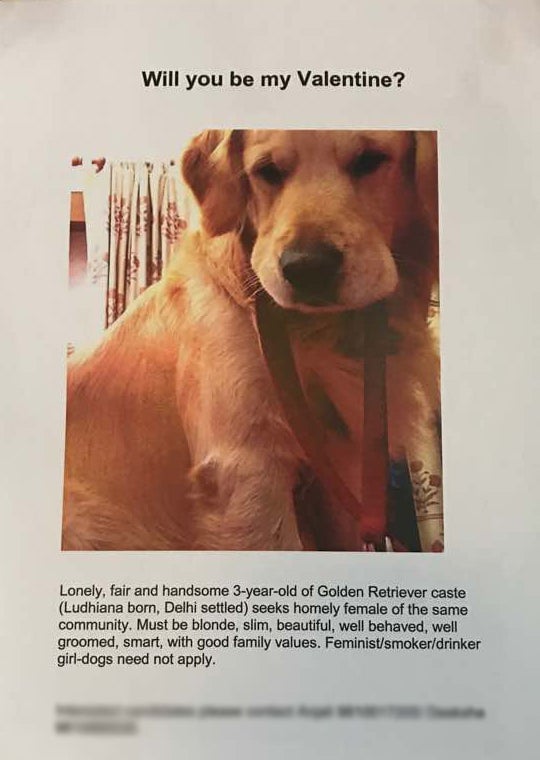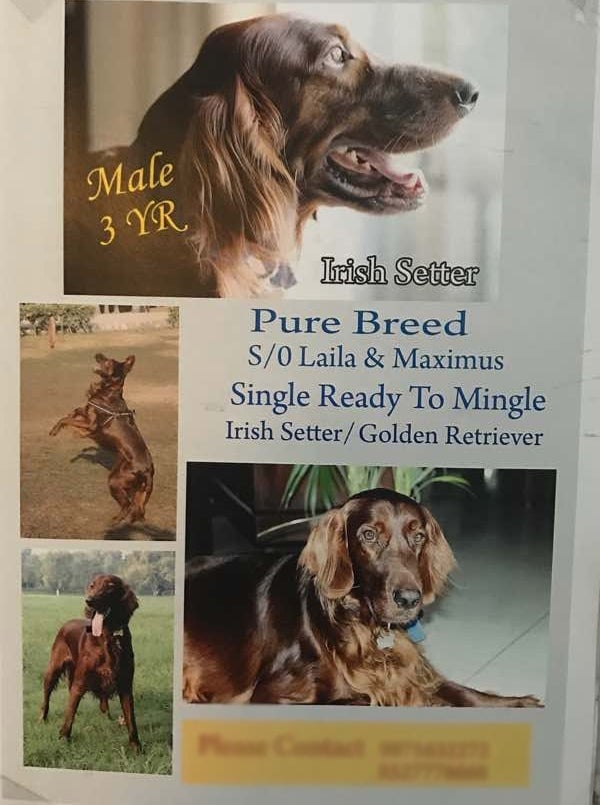Wealthy dog owners in India are using matrimonial ads to find the perfect mates for their pets
In a lane of Delhi’s tony Khan Market neighbourhood, there is a hard-to-miss matrimonial advertisement pinned to a wall that would fit right into the pages of most Indian newspapers: “Lonely, fair, and handsome, three-year-old Golden Labrador (Ludhiana caste, settled in Delhi) seeks homely female of the same community. Must be blonde, slim, beautiful, well-behaved, well-groomed, smart with good family values. Feminist/smoker/drinker girl-dogs need not apply.”


In a lane of Delhi’s tony Khan Market neighbourhood, there is a hard-to-miss matrimonial advertisement pinned to a wall that would fit right into the pages of most Indian newspapers: “Lonely, fair, and handsome, three-year-old Golden Labrador (Ludhiana caste, settled in Delhi) seeks homely female of the same community. Must be blonde, slim, beautiful, well-behaved, well-groomed, smart with good family values. Feminist/smoker/drinker girl-dogs need not apply.”
On the same wall, another golden retriever advertises that he is seeking a fun-loving, beautiful, and intelligent “wifey to settle down and start a family with.”
“If humans can have matrimonials, why not dogs?” asked Atul Khanna, who wrote, printed, and pasted a poster in Khan Market looking for a mate for his dog Moltu, a two-and-a-half-year-old Maltese, whom he described as “independent and spunky.” Though Moltu and Khanna are yet to receive a response, the 48-year-old PR consultant, and Moltu’s wingman, said patience is key when it comes to looking for the right mate.
In a city where urban alienation is high, it appears to be getting harder for both people and dogs to find new partners. Fellow dog-lover Prateek Saraf, 42, rued the lack of options online: “Pages exist but they are not active.” Saraf’s ad for his two-year-old terrier reads: “Now my folks want me to settle down and have my own family so if you are interested, call them…”
Unlike most canines, owners have high expectations about the compatability of their pets’ prospective mates. If using humour like “golden retriever caste looking for mate from same community” is in poor taste in a caste-ridden society, animal lovers and activists say there is another reason to worry.
“This is probably the dog owners’ way of showering love on their dog, or just being cute,” said Pallavi Dar. “But how many of them really know that dog breeding—even if you are not a professional breeder—is serious business? You can’t just mate your dog and give away or sell off puppies, you need to have a licence for that.” Dar volunteers at a dog shelter in Noida.
Despite clear guidelines from the Animal Welfare Board of India, an advisory body under the ministry of environment and forests, Dar says few people pay heed to the ethics of dog breeding.
“Many dog owners might not even know anything about the basic guidelines that state the ideal age for mating the dog, the frequency at which it should be mated, the important supplements and veterinary care to be given to the pregnant dog, new-born puppies and the lactating mother, and up to what age they should be allowed to birth puppies,” she explained.

Seema Menon was fortunate to grow up on a tea estate where the hills gave her numerous dogs—both pedigree and desis—a lot of space to run around.
“City homes with their polished floors should be the last place for big-built dogs and even the small species that are not suitable for our climate,” she said. The Gurgaon-based entrepreneur had a German Shepherd who suffered epileptic attacks from the age of one. Menon speculated that one of the puppy’s parents may have had a genetic condition which she knew nothing of when they were mated. Tragically, the dog had to be put down when he was just five.
Before Simba died, Menon was asked if she would like to mate him with another German Shepherd; in turn, she was promised her pick of the litter: a new puppy to replace her dying dog. “I refused point-blank. The pups would have, in all probability, inherited Simba’s condition.”
Kiran Rao, a veterinarian, said, “Like humans who find matches for their children through advertisements or through some relatives and friends, and then check their gotrams to keep any genetic problems at bay, you must find a good match for your dog only from people you know well, like vets, dog trainers, etc., who can be answerable in case things go wrong. Look for those partners that have been registered with the Kennel Club of India.”
Inbreeding—the mating of closely-related dogs—needs to be controlled, insist animal activists. It might keep the purity of the bloodline intact, but it limits the genetic stock, causing a number of problems. Inbreeding can lead to sick, unhealthy, and stunted puppies with heart problems, deafness, respiratory issues, hip dysplasia, bow legs, and other health complications which start surfacing when the puppies are between three and six months old. Once puppies fall sick, they are frequently abandoned; a purebred is cheaper to buy than care for.

Moreover, the injudicious breeding of purebred dogs to get more purebred puppies often means that the puppies are separated from their mothers too early, something which can lead to health complications early on.
Shiv Marwah, who picked up his Golden Retriever when he was just a month old, said his vet could not decipher what was wrong with Carrot for a long time. Finally, the doctor realised that Carrot’s problems were likely the result of having been taken away from his mother when he had spent less than the mandatory 45 days with her.
“In just the six months that he lived, Carrot was constantly on drips, antibiotics, and medicines through the day,” Marwah, 42, said. “The X-ray and blood reports did not reveal anything; it was heart-rending to see him suffer so much. It all ended much too tragically for all of us, and although it’s been about two years since Carrot went, our ten-year-old son, Rohan, still weeps in his memory.”
Pranjal Dias, who runs a kennel for dogs in Goa, said many people believe pedigree dogs are better behaved while strays genetically “belong to the street.” She laughed recalling this, surrounded by the nine strays she adopted off the streets, each one of them absolutely domesticated.
Talking about how she is often asked to turn matchmaker (“because I am in touch with many dog owners”), she said, “I am aware of their background, so I do help out dog owners, but insist that all health and bloodline issues of the potential partner be checked out first. Because you never know which dog could be passing on the aberrant genes.”
This post first appeared on Scroll.in. We welcome your comments at [email protected].